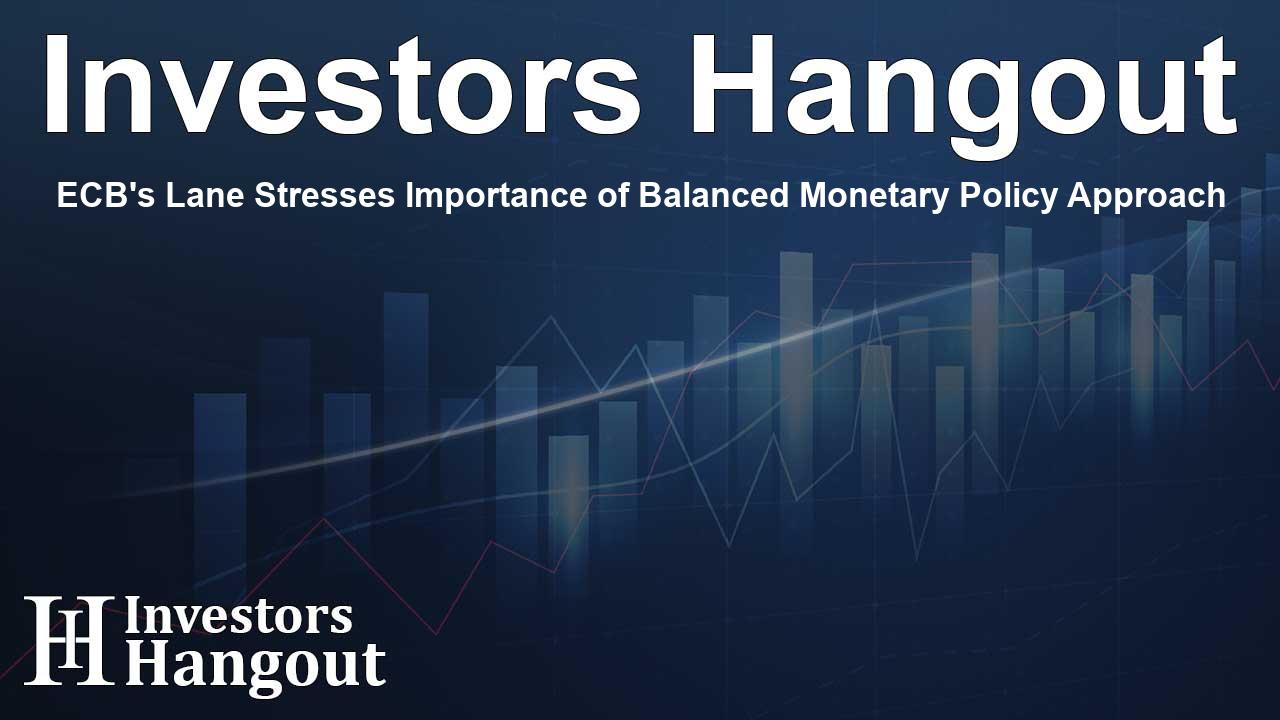ECB's Lane Stresses Importance of Balanced Monetary Policy Approach

ECB's Lane Highlights Monetary Policy Adjustments
Recently, Philip Lane, the chief economist of the European Central Bank (ECB), shared insights regarding the future of monetary policy in a discussion with a leading French publication. He expressed concerns about maintaining a restrictive monetary policy for extended periods. According to Lane, such an approach could hinder economic growth and potentially lead to inflation rates dipping below established targets.
Understanding the Role of Monetary Policy
Monetary policy plays a crucial role in shaping economic conditions. The ECB has been navigating complex economic landscapes, and its decisions directly affect business investment, consumer spending, and, ultimately, inflation rates. Lane’s comments underscore a pivotal balance: too much restriction can stifle growth, while too much leniency risks unchecked inflation.
The Importance of Timing
Lane highlighted that while the ECB must be cautious, it is also essential not to rush into easing policies. His comments indicate the ECB's desire for flexibility in its decision-making process, suggesting that any easing of policies will be implemented thoughtfully. This approach aims to foster a stable economic environment where growth can flourish without the threat of rising inflation.
Economic Growth and Inflation Targets
Lane's assertion reflects a deeper understanding of the interconnectedness of inflation and economic growth. When monetary policy is overly restrictive, businesses may hold back on investment, and consumers might reduce spending, leading to slower economic growth. As a result, inflation may not achieve the ECB's targets, making sustained growth a priority for the overall economic health of the region.
Future Outlook of ECB's Policy Decisions
As the ECB navigates its monetary policy strategy, Lane's remarks suggest a commitment to adapting their approach based on evolving economic indicators. The anticipation of changes in policy reflects broader economic conditions, including labor market dynamics and global economic influences. The ECB’s focus on avoiding long-term restrictions in monetary policy aims to strike a balance that supports sustainable growth.
Strategic Planning in Unpredictable Times
In a period marked by uncertainty, the ECB is tasked with responding to unpredictable market dynamics. Lane's insights emphasize the necessity for careful planning and adaptability. Policymakers must continuously analyze data and respond dynamically to ensure that measures taken align with economic progress and inflation goals.
Conclusion: A Call for Balance in Policy Decisions
The European Central Bank remains at a pivotal crossroads where strategic monetary policy decisions will profoundly impact the economy. Philip Lane's emphasis on not maintaining restrictive measures for too long encapsulates the delicate balance policymakers must maintain to foster an environment conducive to growth while keeping inflation in check. As the economic landscape evolves, the ECB will continue to face challenges that require astute judgment and flexible strategies.
Frequently Asked Questions
What did Philip Lane say about monetary policy?
Philip Lane emphasized that monetary policy should not remain too restrictive for extended periods to ensure economic growth and stable inflation rates.
Why is a restrictive monetary policy a concern?
A prolonged restrictive monetary policy can hinder economic growth and lead to inflation falling below desired targets.
What is the role of the ECB in managing inflation?
The ECB aims to maintain price stability and equilibrium in the economy through setting interest rates and other monetary policies.
How does monetary policy affect consumer spending?
Changes in monetary policy influence interest rates, which can impact borrowing costs, thus affecting consumer spending and investment decisions.
What does Lane suggest about future ECB policies?
Lane suggests that the ECB will maintain flexibility in its monetary policy decisions to adapt to changing economic conditions.
About Investors Hangout
Investors Hangout is a leading online stock forum for financial discussion and learning, offering a wide range of free tools and resources. It draws in traders of all levels, who exchange market knowledge, investigate trading tactics, and keep an eye on industry developments in real time. Featuring financial articles, stock message boards, quotes, charts, company profiles, and live news updates. Through cooperative learning and a wealth of informational resources, it helps users from novices creating their first portfolios to experts honing their techniques. Join Investors Hangout today: https://investorshangout.com/
Disclaimer: The content of this article is solely for general informational purposes only; it does not represent legal, financial, or investment advice. Investors Hangout does not offer financial advice; the author is not a licensed financial advisor. Consult a qualified advisor before making any financial or investment decisions based on this article. The author's interpretation of publicly available data shapes the opinions presented here; as a result, they should not be taken as advice to purchase, sell, or hold any securities mentioned or any other investments. The author does not guarantee the accuracy, completeness, or timeliness of any material, providing it "as is." Information and market conditions may change; past performance is not indicative of future outcomes. If any of the material offered here is inaccurate, please contact us for corrections.